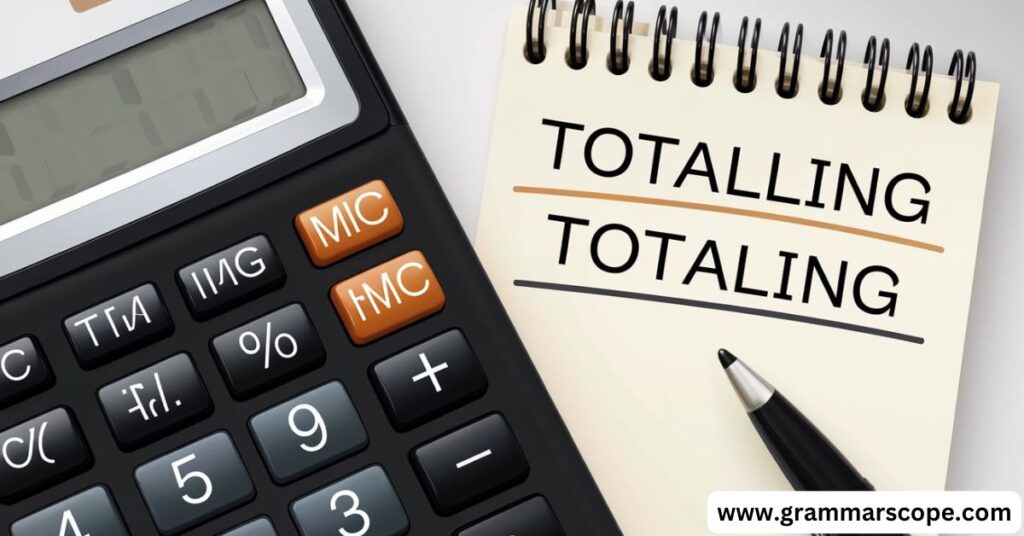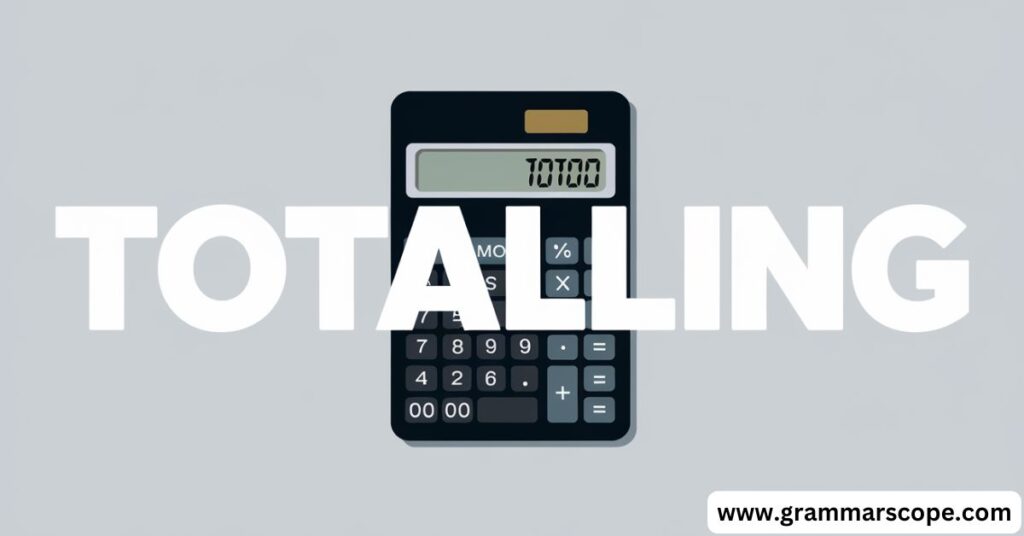When it comes to the English language, spelling variations often spark confusion. One such example is the debate between “totalling” and “totaling.” This seemingly minor difference has left many wondering which form is correct. Should you use the British spelling or the American one?
Understanding this distinction goes beyond mere preference—it reflects the regional norms of English usage. Whether you’re drafting an email or preparing a report, knowing which spelling to choose is crucial.
What Do “Totalling” and “Totaling” Mean?

At their core, “totalling” and “totaling” mean the same thing. They both refer to the act of adding up numbers or figures to reach a sum. This term frequently appears in contexts like financial statements, invoices, and reports where summing values is essential. While the meaning remains consistent, the spelling varies depending on regional preferences in English.
For instance, if you’re in a British English-speaking region, “totalling” is the accepted spelling. Meanwhile, in American English, “totaling” is preferred. Both versions derive from the base word “total,” which means “the whole amount.”
Example of Usage in an Email
- British English: “Dear Sarah, I am currently totalling the expenses for last quarter’s project and will share the final numbers by tomorrow.”
- American English: “Dear Sarah, I am currently totaling the expenses for last quarter’s project and will share the final numbers by tomorrow.”
“Totalling” or “Totaling”: What’s the Difference?
The primary difference between “totalling” and “totaling” lies in regional spelling conventions. British English typically doubles the final consonant when adding a suffix to verbs ending in a vowel-consonant combination, such as “total.” Thus, “totalling” with two Ls aligns with British spelling rules. On the other hand, American English often drops the second consonant in similar scenarios, resulting in “totaling.”
This pattern is consistent across other verbs, such as:
- British English: cancelling, travelling, marshalling
- American English: canceling, traveling, marshaling
While these rules guide most spellings, some words may deviate based on etymology or common usage.
Quick Reference Table:
| Term | Region | Example Sentence |
|---|---|---|
| Totalling | British English | “He is totalling the monthly expenses for the department.” |
| Totaling | American English | “She is totaling the numbers to finalize the budget report.” |
Why Is There Confusion Between “Totalling” and “Totaling”?
The confusion stems from the divergence in spelling conventions between British and American English. This discrepancy is a result of historical influences on the English language. Noah Webster, the American lexicographer, simplified certain spellings in the early 19th century to distinguish American English from its British counterpart. As a result, words like “travelling” became “traveling” and “totalling” evolved into “totaling” in the United States.
Fun Fact
Spelling differences between British and American English are not limited to doubling consonants. Examples include:
- Colour (British) vs. Color (American)
- Centre (British) vs. Center (American)
- Programme (British) vs. Program (American)
Pro Tips
The most important part of this article is understanding the regional differences in spelling conventions between British and American English. This section not only clarifies the distinction but also provides examples to help you apply the correct spelling in context. For instance, when writing a business email to a global audience, choosing the appropriate spelling can enhance professionalism and clarity. Aligning your language with your recipient’s norms shows attention to detail and respect for linguistic preferences.
Synonyms of “Totalling” or “Totaling”

If you’re looking to avoid potential confusion, consider using synonyms of “totalling” or “totaling.” These alternatives work well in professional or casual writing:
- Adding up: “He is adding up the figures for the final report.”
- Summing: “They are summing the totals from the sales data.”
- Tallying: “She is tallying the votes from the recent election.”
- Calculating: “We are calculating the total costs for the renovation.”
- Aggregating: “The system is aggregating the data for the monthly report.”
Using “Totalling” and “Totaling” in Sentences
Here are some practical examples to show how “totalling” and “totaling” appear in sentences:
British English Examples
- “I am totalling the sales revenue for the past year.”
- “The report mentioned totalling errors in the accounting software.”
- “While totalling the votes, the committee noticed a discrepancy.”
American English Examples:
- “We are totaling the costs to finalize the project budget.”
- “The software flagged an issue while totaling the numbers.”
- “After totaling the results, we identified some inconsistencies.”
Totalling

“Totalling” is widely used in regions that follow British English norms, including the UK, Australia, and parts of Canada. It appears frequently in academic papers, official documents, and business communications.
Scenario Example
“Dear Mr. Johnson, I’ve completed totalling the team’s hours for the week. Please find the detailed breakdown in the attached spreadsheet.”
Totaling
“Totaling” dominates in American English-speaking regions, such as the United States and parts of Canada. It’s commonly found in corporate emails, financial documents, and informal communications.
Scenario Example
“Hi Emily, I’ve been busy totaling all expenses related to the marketing campaign. I’ll send the final numbers shortly.”
A Final Look
Choosing between “totalling” and “totaling” ultimately comes down to regional preference and audience expectations. If you’re writing for a British audience, “totalling” is your best choice. For an American audience, “totaling” is the way to go. In professional or international contexts, it’s wise to align with your organization’s style guide or default to the audience’s regional norms.

Emma Olivia is an experienced blogger and the creative mind behind Grammar Scope. With a passion for language and years of writing expertise, she crafts engaging, informative content that simplifies grammar and writing tips for readers worldwide. Emma’s dedication to clear communication and love for the written word shine through every article she publishes, making Grammar Scope a trusted resource for language enthusiasts and learners alike.







